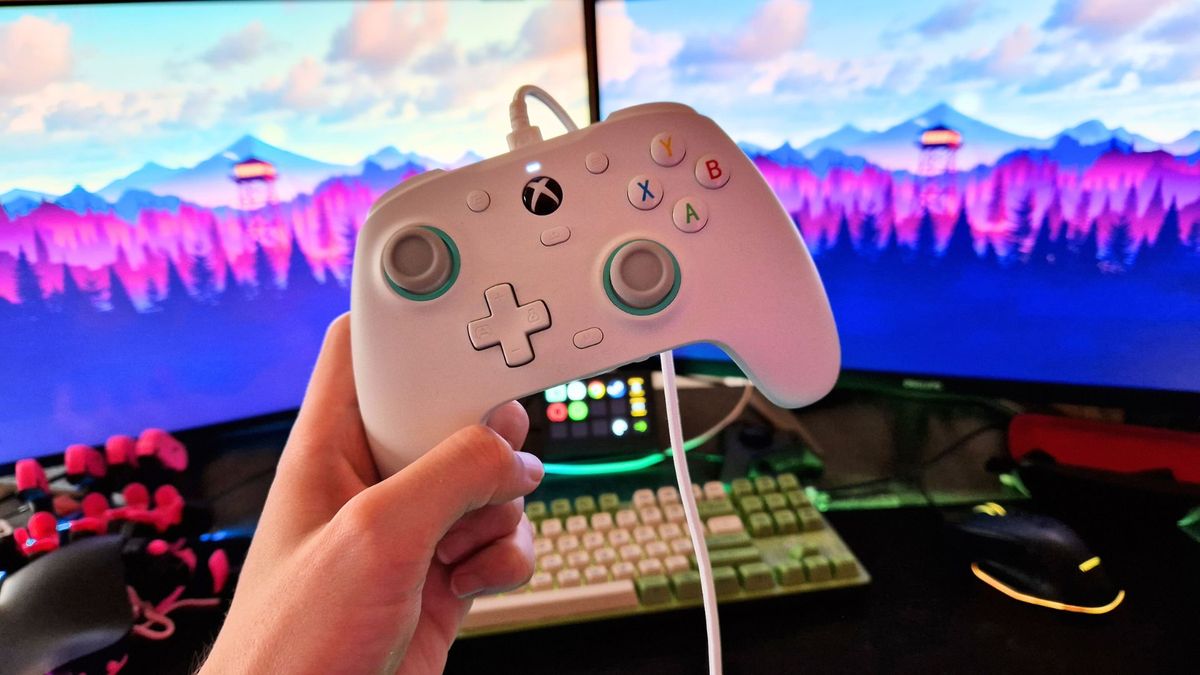12DOVE Verdict
The GameSir G7 SE gives you an awful lot of value for money for a budget price. Two extra back buttons, Hall Effect thumbsticks, full software customization, and great ergonomics all make you wonder if the standard Xbox Wireless Controller is even worth buying these days.
Pros
- +
Great back buttons
- +
Hall Sensor sticks
- +
Nice vibration
- +
Excellent for platforming
- +
Decent price
Cons
- -
Slightly less comfortable than the T4 Kaleid
- -
Big dead zones out of the box
- -
No wireless connectivity
Why you can trust 12DOVE
The GameSir G7 SE is, officially, the first fully licensed Xbox Series X controller with Hall Effect sticks. I'm a big admirer of GameSir, because they always manage to put out excellent gamepads while offering some of the lowest prices you'll find. For a lot of folks, those cheap price tags will sound alarm bells, but with GameSir, you get nothing short of top-drawer quality - every time.
Not that Xbox's own stock controllers are known for their stick drift, but it's nice to see Hall Effect thumbsticks making their way into the mainstream console ecosystem. Peace of mind can be hard to come by when purchasing controllers these days, and getting it from a budget brand just shows you how easy it could be for PlayStation and Nintendo.
Some of the best Xbox Series X controllers can offer a lot more functionality and customization than the G7 SE, but you're not everyone is looking for that. The G7 SE targets that player who only wants a little bit more from their gamepad, and doesn't want to break the bank while doing so. The G7 SE will set you back $49 / £49, and with Hall sticks, two back buttons, and the same compatibility on PC and Xbox Series consoles, it might just make the controller that comes with your Xbox completely redundant.
Design and Features
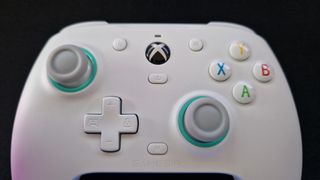
Unlike its slightly larger transparent sibling, the GameSir T4 Kaleid, the G7 SE has a very clean-looking off-white colour. Beyond a subtle grey back that's textured for grip, and some light blue accents around the thumbsticks, that's really it in the looks department here. This is a modest-looking controller that manages to look clean while slotting in easily with the design of a Series X or S.
There are, however, some magnetic faceplate options. You can remove these and swap them out for different colours - GameSir lists a black and a beige colour, but I know part of the marketing for this gamepad has focused on the fact you can decorate these faceplates by painting them. I have the artistic skill of an elephant riding a unicycle - so I haven't tested this myself, but I'm sure it's more than possible.
On the front, you'll find what's often the standard for the best PC controllers. It's an asymmetrical layout in line with Xbox's machinations, and there are X, Y, B, and A buttons. There's an Xbox home button, a share button, and an in-game menu button as well. As is common with GameSir, you'll find a small M button right at the bottom of the controller's mid-section - this helps you access the extra functions the gadget has to offer, like back button assignments and extra D-pad uses.
Speaking of which, the simple 4-direction D-pad lets you adjust volume and party chat mixes while in a game - which is a handy little shortcut to have in a budget controller. It's also nice to see this be integrated into a standard controller body, as opposed to something like the Asus ROG Raikiri Pro or the Turtle Beach Recon, which add extra buttons for this, and always look a bit intimidating and messy.
On the top, you get some Xbox-shaped triggers and bumpers - these never let me down and felt just as good to use for accurate acceleration in Forza Horizon 5 as they did shooting space pirates in Starfield. There's not a lot to note about them really, although I'd say GameSir maybe could have pushed the boat out a little more with the shape of the bumpers to make them more slip-resistant. See my review of the Raikiri Pro for more of an example.
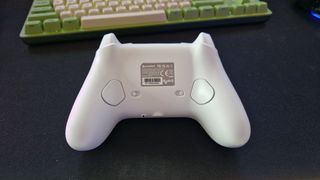
What folks like me will be most interested in are the back buttons of this controller. GameSir has a knack for placing these exactly where your fingers grip, and that hasn't changed with the G7 SE. In short, the back buttons here are excellent in terms of comfort and provide a really tactile feel when pressing them in. They feel nice and large too, so you won't have much trouble finding them if you're in a more stressful gameplay scenario.
For those who don't have any need for these back buttons, GameSir has thought of a really handy solution. In lieu of a trigger stop mechanism, you'll find two notches that can be slid left or right to fix these back buttons in place. If you're playing a game where accidental presses to these buttons would actually be a hindrance, you can just flick these switches, and the back buttons camouflage beautifully into the ergonomic design of the controller. This is a lovely bit of design, and for the type of audience this controller is going after, I think it's a brilliant feature to include.
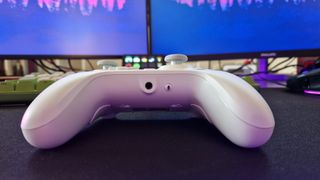
The GameSir G7 SE has four profiles on board for switching these back button assignments out, too, which, in my opinion, is great value for money. You can connect one of the best gaming headsets through a 3.5mm audio jack which is on the bottom of the controller and placed centrally, unlike the Xbox Elite Series 2 Core which places it toward the left side. Additionally, you'll find a press-in mute button right next to the audio jack. The G7 SE has no wireless connectivity, but you do get a standard 3m braided USB-C cable in the box.
The G7 SE has a weight of 221g / 0.49lbs, so feels really light in the hands. This is despite the inclusion of four rumble motors split across the grips and triggers. The entire controller can be customised through GameSir's Nexus software, which is useful seeing as the large-feeling thumbstick dead zones out of the box made playing Starfield in first-person fairly awkward.
Performance
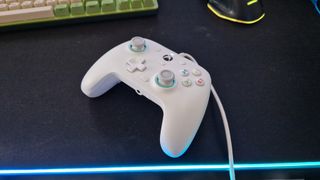
Overall, let me say I'm really happy with how the GameSir G7 SE performed in the usual range of testing games. I'm not the biggest fan of the stock Xbox controller, and the G7 SE's back buttons, profiles, and Hall sensor sticks make me honestly think there's no reason to buy the original this has been designed against. There's a lot of value to be had in this budget price tag, and the options for extra functionality are a real treat for those who want them.
In Forza Horizon 5, things worked smoothly, and it felt like the snappy action of the membrane face buttons and rich clacks as I pushed the thumbsticks one way or the other contributed greatly to game feel. In particular, I'd praise the rumble motors of the G7 SE. These don't go over the top and provide really subtle feedback that I honestly didn't even notice at times. It just blends so well into the feeling of playing a game and comes across naturally without creating annoying noise pollution.
Where this controller really came into its own was when playing platforming games, and more simplistic top-down RPGs. Specifically, Tiny Thor and Celeste felt excellent with the G7 SE in hand. Besides maybe Towerfall Ascension (one of the best games of all time, by the way), I tend to give back buttons a miss in 2D platforming games. For the most part, there's no real need for them since you only tend to have so many in-game actions to control. With the G7 SE, however, jumping was snappier when using one of the back buttons, and mapping the dash in Celeste to the other meant I was racing through difficult screens.
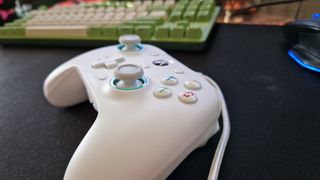
Thanks to that level of comfort the G7 SE gives you, games like Eastward also felt great. That game is fairly relaxed, there isn't always an awful lot going on, and for the most part, you might only need one or two buttons, so having a controller that can rest in your hands without any discomfort is really nice.
An area I think I'd say the GameSir G7 SE slipped up, is in controlling first-person games - particularly Starfield and High on Life. There's been a lot said for Hall Sensor sticks playing quite hot - that is, they control more sensitively than potentiometer ones. I noticed that slightly with the T4K, but it never really gave me trouble. On the whole, I always tend to bump my stick sensitivity up where I can anyway. I don't know what it is with the G7 SE, but I feel like the combination of larger dead zones and Hall Sensor sensitivity mean games in first-person are a bit unruly at times, and I just couldn't get that level of control I wanted - no matter how much I fiddled with in-game settings.
I think there's something about the shape of the thumbsticks to be said for this too. While the outer rims have the same textures as Xbox's homemade controllers, the ones on this controller are missing that concave shape. This means your thumbs frequently feel like they slip off, which is a real shame.
This wouldn't be my first choice of controller for first-person shooters, and on PC alone, the T4 Kalied would get my vote. It feels a little bit more comfortable to me because it's slightly larger. As an all-rounder in third-person and platforming games though, the G7 SE does such a great job for the price.
Should you buy the GameSir G7 SE?
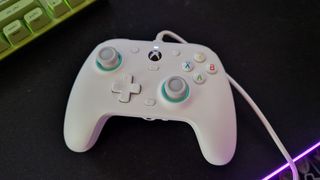
The GameSir G7 SE is one of those budget controllers that begs the question: Is the standard Xbox controller redundant? The G7 SE costs almost exactly the same (depending on the edition of Xbox Wireless controller we're comparing to), it has two extra back buttons, onboard profiles, Hall sticks, and extra functions for controlling audio. In the growing wave of Xbox Series X controllers and the pre-existing group of Xbox One controllers, it's hard to find as much value for money as this.
If you want a specialist performance controller, I'd maybe look elsewhere, and increase your budget. If that's you, an Xbox Elite Series 2 will never let you down. Similarly, if you have larger hands and want something solely for PC usage, I'd recommend the T4 Kaleid over this.
On the other hand, if it's a general controller you're looking for on Xbox and PC, the Gamesir G7 SE is a real winner, and I recommend you get this over a replacement Wireless Controller. Particularly if you haven't used something with back buttons before, I can see this being a gateway drug for a lot of players. It might just be the gamepad I come back to for those tight 2D platforming games from now on.
How we tested the GameSir G7 SE
I tested the GameSir G7 SE on and off for around a month before this review, as I put into my rotation of Xbox and PC controllers. For the most part, I used it on PC to play games like Tiny Thor and Celeste. I also used it extensively on Xbox Series X in that time, playing Starfield, Dishonored Definitive Edition, High on Life, Forza Horizon 5, Eastward, and Tunic.
I compared my experience closely to my time with other Xbox and PC controllers on the market, especially the GameSir T4 Kaleid, as the two gamepads share a lot of the same features and design philosophies.
If you'd like to read more about the ways we test the latest gaming accessories here at 12DOVE, have a gander at our hardware policy.
Need a sim controller for flying or driving? We have you covered. Take a look at the best Xbox steering wheel, the best joysticks, and the best racing wheel for PC.
One of my earliest memories is playing SuperMario64 and wondering why the controller I held had three grips, but I only had two hands. Ever since I've been in love with video games and their technology. After graduating from Edinburgh Napier University with a degree in Journalism, I contributed to the Scottish Games Network and completed an Editorial Internship at Expert Reviews. Over the last decade, I’ve been managing my own YouTube channel about my love of games too. These days, I'm one of the resident hardware nerds at 12DOVE, and I take the lead on our coverage of gaming PCs, VR, controllers, gaming chairs, and content creation gear. Now, I better stop myself here before I get talking about my favourite games like HUNT: Showdown, Dishonored, and Towerfall Ascension. Location: UK Remote

"30 years of history reside in our tape backups": PlayStation's building a game preservation mineshaft vault with 200 million files going back to a 1994 build of PS1 JRPG Arc the Lad

The other big Soulslike out this week has some Bloodborne and Dark Souls 3 in its combat, dev says, but "we would rather call AI Limit an action RPG"

The Last of Us showrunner says "so much" has happened in the five-year gap since we last saw Joel and Ellie: "That's part of the mystery of the season"
